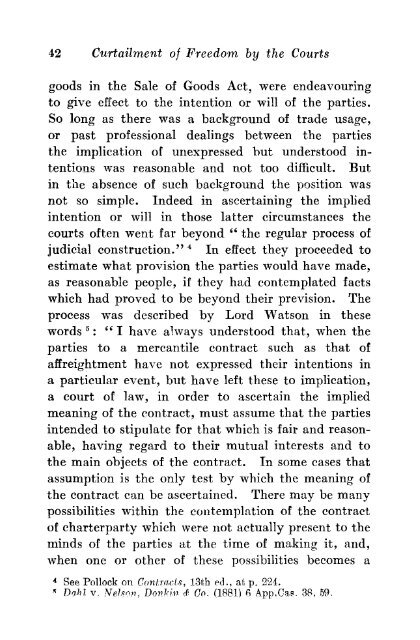The Sanctity of Contracts in English Law - College of Social ...
The Sanctity of Contracts in English Law - College of Social ...
The Sanctity of Contracts in English Law - College of Social ...
- No tags were found...
Create successful ePaper yourself
Turn your PDF publications into a flip-book with our unique Google optimized e-Paper software.
42 Curtailment <strong>of</strong> Freedom by the Courtsgoods <strong>in</strong> the Sale <strong>of</strong> Goods Act, were endeavour<strong>in</strong>gto give effect to the <strong>in</strong>tention or will <strong>of</strong> the parties.So long as there was a background <strong>of</strong> trade usage,or past pr<strong>of</strong>essional deal<strong>in</strong>gs between the partiesthe implication <strong>of</strong> unexpressed but understood <strong>in</strong>tentionswas reasonable and not too difficult. But<strong>in</strong> the absence <strong>of</strong> such background the position wasnot so simple. Indeed <strong>in</strong> ascerta<strong>in</strong><strong>in</strong>g the implied<strong>in</strong>tention or will <strong>in</strong> those latter circumstances thecourts <strong>of</strong>ten went far beyond " the regular process <strong>of</strong>judicial construction." 4 In effect they proceeded toestimate what provision the parties would have made,as reasonable people, if they had contemplated factswhich had proved to be beyond their prevision. <strong>The</strong>process was described by Lord Watson <strong>in</strong> thesewords 5 : "I have always understood that, when theparties to a mercantile contract such as that <strong>of</strong>affreightment have not expressed their <strong>in</strong>tentions <strong>in</strong>a particular event, but have left these to implication,a court <strong>of</strong> law, <strong>in</strong> order to ascerta<strong>in</strong> the impliedmean<strong>in</strong>g <strong>of</strong> the contract, must assume that the parties<strong>in</strong>tended to stipulate for that which is fair and reasonable,hav<strong>in</strong>g regard to their mutual <strong>in</strong>terests and tothe ma<strong>in</strong> objects <strong>of</strong> the contract. In some cases thatassumption is the only test by which the mean<strong>in</strong>g <strong>of</strong>the contract can be ascerta<strong>in</strong>ed. <strong>The</strong>re may be manypossibilities with<strong>in</strong> the contemplation <strong>of</strong> the contract<strong>of</strong> charterparty which were not actually present to them<strong>in</strong>ds <strong>of</strong> the parties at the time <strong>of</strong> mak<strong>in</strong>g it, and,when one or other <strong>of</strong> these possibilities becomes a4 See Pollock on <strong>Contracts</strong>, 13th ed., at p. 224.•* Dohl v. Nelson, DonV<strong>in</strong>
















